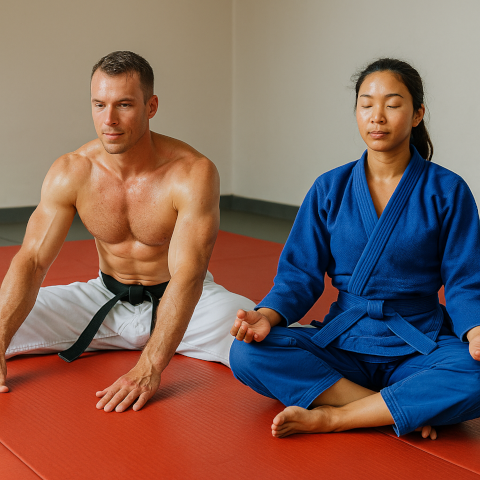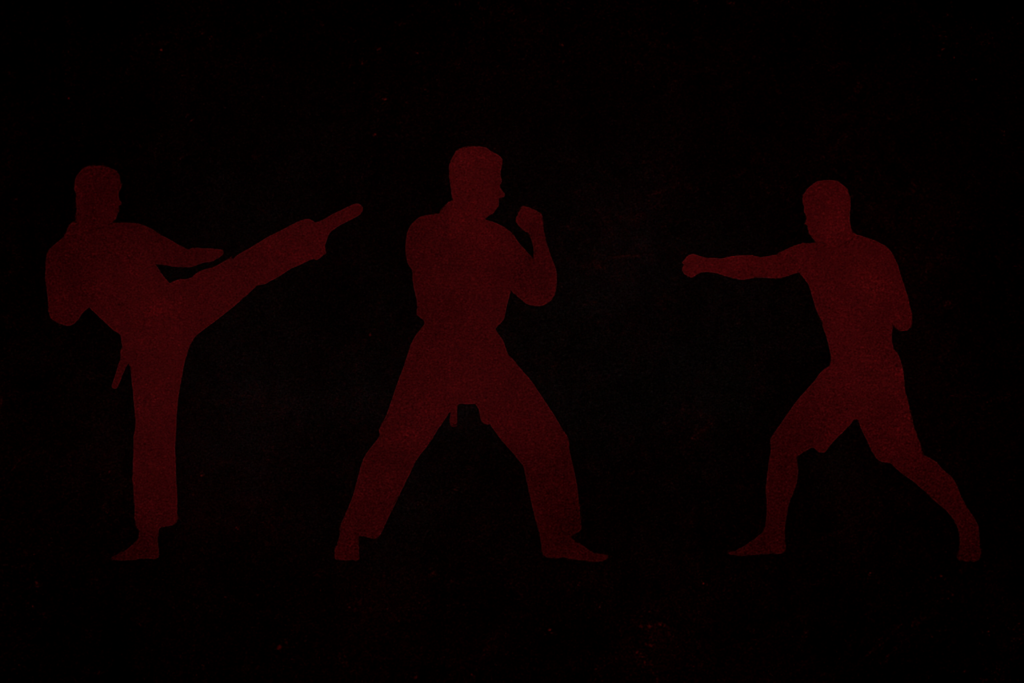(How Martial Artists Stay Strong, Prevent Injury, and Sharpen Their Mind)
Introduction

Martial arts training pushes your body and mind. Between grappling or sparring, conditioning drills, and technique work, your muscles, joints, and psyche are under stress. Recovery isn’t optional—it’s essential. In this post, we’ll explore how proper recovery prevents injury and how training martial arts builds mental resilience. Whether you’re just starting out or have years under your belt, these tips will help you stay consistent and strong.
Physical Recovery & Injury Prevention
- Warm-ups, Cool-downs & Mobility Work
- Begin every session with dynamic warm-ups: light cardio, joint rotations, mobility drills. This increases blood flow, primes muscles, and reduces risk of strains
Further Reading: OrthoInfo: Martial Arts Injury Prevention - After training, do static stretching or foam-rolling to help muscles relax and reduce stiffness.
- Begin every session with dynamic warm-ups: light cardio, joint rotations, mobility drills. This increases blood flow, primes muscles, and reduces risk of strains
- Structured Rest & Active Recovery
- Take rest days every week or two. Muscles, nervous system, and joints need time. Overtraining leads to wear-and-tear injuries.
- On rest days, do low-impact, restorative activity: yoga, gentle swimming, mobility flows. Helps circulation, reduces stiffness.
- Nutrition, Hydration & Sleep
- Fuel up after training: protein helps muscle repair; carbohydrates refill energy stores. Healthy fats and anti-inflammatory foods help too.
- Stay hydrated. Dehydration worsens fatigue, slows recovery, raises injury risk.
- Prioritize sleep: aim for 7–9 hours per night. During deep sleep your body repairs tissue, balances hormones, consolidates motor learning.
- Protective Measures & Technique
- Use proper form — in strikes, throws, grappling. Poor technique leads to repetitive stress injuries.
- Gear: wraps, shin guards, proper mat / floor padding — protect vulnerable body parts.
- Pay attention to signs: persistent pain, joint clicking, swelling. Don’t push past warning signs. Early care = faster recovery.
Mental Resilience: Why It Matters & How Martial Arts Helps
- Stress Reduction & Well-Being
- Martial arts training (sparring, forms, drills) is shown to reduce symptoms of anxiety, improve general well-being in practitioners. A systematic review using 14 studies found martial arts has a small‐to‐medium positive effect on wellbeing and internalising mental health (e.g. anxiety/depression) vs non-practitioners.
- The rhythm of training + release of endorphins = mood lift. Controlled intensity, discipline, effort + recovery can improve emotional stability.
- Improved Coping & Resilience
- One study found martial arts practitioners have higher psychological resilience (ability to cope with stress/challenges) especially in “control” and “challenge” sub-dimensions compared to people who don’t do martial arts.
Further reading: PubMed: Building resilience through self-defense: the role of martial arts in enhancing psychological strength among women - Facing setbacks (mistakes, losses, “bad” training days) teaches you to adapt, persist, and control emotions under pressure.
- One study found martial arts practitioners have higher psychological resilience (ability to cope with stress/challenges) especially in “control” and “challenge” sub-dimensions compared to people who don’t do martial arts.
- Focus, Mindfulness & Self-Control
- Martial arts demands concentration: executing techniques correctly, being aware of your balance, breath, body movement. This sharpens focus outside training too. Some arts (Tai Chi, etc.) emphasize mind-body awareness explicitly.
- Learning to stay calm in sparring or under fatigue builds self-control, reduces impulsivity, enhances decision making.
- Confidence, Discipline & Goal Setting
- Progress in martial arts happens visibly: learning techniques, belts/ranks, improving skill and stamina. These milestones build confidence.
- The discipline required (show up, push through, train even when it’s tough) builds habit, character, work ethic.
- Setting goals (e.g. improve your endurance, master that throw) gives direction, motivation, sense of achievement.
Putting It Together: How to Use Recovery + Mental Resilience in Your Routine
- Plan weekly schedules: Include at least one full rest or active recovery day per week.
- Track your sleep, hydration, and post-training soreness. If fatigue or soreness persists, cut back intensity.
- Incorporate mental training: breathing exercises, mindfulness, visualization of techniques or outcomes.
- Use a journal or log: record how you feel after sessions, what had good recovery, what didn’t. Over time you’ll see patterns.
Conclusion
Being consistent in martial arts isn’t just about showing up every day—it’s about knowing when to train and when to recover. By using smart recovery strategies and developing mental resilience, you’ll:
- reduce risk of injury and burnout
- improve performance and stamina
- gain confidence, focus, and discipline
If you treat recovery as part of training, not an afterthought, your body and mind will grow stronger together. Let martial arts be your guide—not just for power, but for sustainable strength and mental edge.

